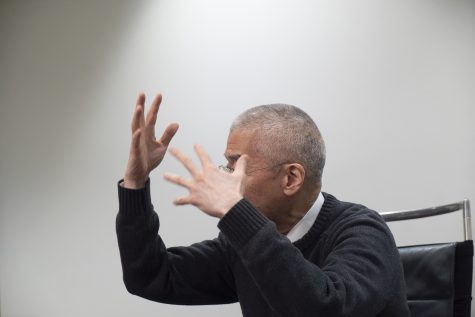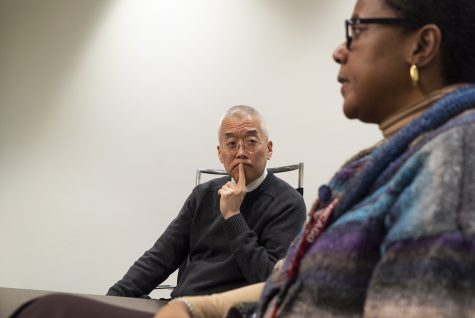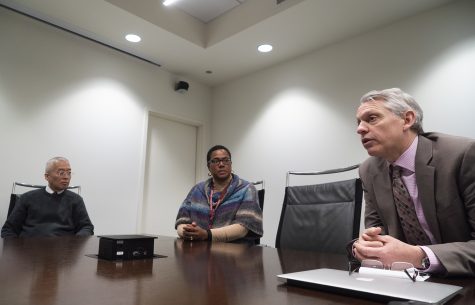Columbia is ‘on pause’: administrators address instruction in the age of the coronavirus

President and CEO Kwang-Wu Kim specifies what the college will be doing to deep clean campus buildings while in-person classes are not in session, including bringing in additional cleaning crews to address areas people are likely to touch, such as doorknobs and elevator buttons.
In response to the Thursday, March 12 email announcing the suspension of classes due to coronavirus concerns, several senior administrators spoke with the Chronicle on the college’s plans to bounce back from the unexpected blow.
“We’re here to help our students, not to penalize them right now,” said President and CEO Kwang-Wu Kim. “We don’t want to be one of the schools that is saying to our students, ‘It’s on you.’”
Administrators acknowledged the initial announcement sent to the campus community Thursday caused some confusion and said they would begin tailoring messages for different groups of students, faculty and staff in the coming weeks that better illustrate the changes to come.
Classes
“We haven’t canceled the semester, we’ve just taken a pause,” said Chief of Staff Laurent Pernot.
Senior Vice President and Provost Marcella David said with the exception of previously designated online classes, no instruction—including exams, projects and homework assignments—will take place for traditional in-person courses before April 6.
However, she said on the rare occasion faculty may be able to easily transition to online instruction, there is a possibility they would be allowed to begin online classes March 23, a move instructors would be expected to communicate to their students.
No tuition reimbursement will be issued because no instruction will be truly missed, David said.
In the next few weeks the college will work with faculty to determine how to transition from in-class to online instruction between April 6 and May 15 in order to meet hourly credit requirements.
David said Columbia will launch a teaching studio on Monday, March 15 where faculty can receive training on Canvas and other online platforms to assist in the transition to online classes. The first studio will be on the third floor of the 33 E. Ida B. Wells Drive building, with additional studios to be announced later.
“We have worked with faculty on a survey to understand what their needs are, especially with regard to technology [and] pedagogy,” David said. “We’re trying to help faculty think creatively about alternatives that are reasonable.”
Pernot said the college will announce via email, Columbia’s website and social media on March 23 what classes will be ready to launch online by April 6.
Campus and dorms
David said administrators decided residence halls and campus-owned facilities will remain open to accommodate students who may not be able to return home or otherwise access certain resources.
According to a Thursday, March 13 email sent from Residence Life to resident assistants, no guests will be allowed in residence halls beginning Saturday, March 14 at noon. Common area amenities in residence halls, such as fitness centers and lobbies, will be closed as a preventative measure to reduce therisk of exposure to the coronavirus.
David said the International Student Services Office would provide further clarification to students who may be worried by the growing pandemic’s intrusion into college life and planning to return home.
The Trump administration has announced flights from 26 European countries are banned for 30 days in an effort to stem the spread of the coronavirus, with more airlines canceling flights as a result, as reported March 10 by the Associated Press.

President and CEO Kwang-Wu Kim listens as Senior Vice President and Provost Marcella David discusses how the suspension of in-person classes will impact instruction.
Employment
While students and faculty are able to work remotely for the most part, David said the college is still assessing whether or not all staff will be required to work on campus.
As long as city officials deem it safe, David said it is likely those who are not infected or at risk of serious illness due to pre-existing conditions will be asked to come to campus.
“The environment for our faculty and staff is already enhanced by reducing the number of students and classes that we have operating in the buildings,” David said.
The University of Illinois at Chicago, DePaul University, Northeastern Illinois University and the School of the Art Institute of Chicago are also requiring staff and faculty members to report to campus for work.
Health
Vice President for Student Affairs Sharon Wilson-Taylor said students should call the Health Center to discuss whether or not they have coronavirus symptoms before going in person.
If students are experiencing symptoms of the coronavirus—including fever, a dry cough and shortness of breath—they should seek testing and medical attention from other clinics prepared to test for the virus as the college’s Health Center does not have test kits, Wilson-Taylor said.
To further prevent the virus from spreading, the college stated in the Thursday announcement it will conduct a “deep cleaning” of all on-campus facilities.
Kim said this cleaning process will focus more attention, time and resources onareas people are likely to touch, such as doorknobs and elevator buttons. There will be an increase in cleaning crews using disinfectants recommended by the Centers for Disease Control and Prevention.
Wilson-Taylor said dorm buildings will also undergo cleaning by outside agencies.

(From left) President and CEO Kwang-Wu Kim, Senior Vice President and Provost Marcella David and Chief of Staff Laurent Pernot discuss the college’s ongoing response to the coronavirus outbreak, which has been classified by President Donald Trump as a “national emergency.”
The impact
Kim and Pernot said the suspension of in-person courses should not affect college finances as facilities will stay open, though David said some additional expenses may develop because of extra work through transitioning classes to an online format.
Kim said there are no current indications the college will suffer drops in enrollment and recruitment, although tours have been canceled for the next three weeks.
While the college plans to proceed with summer study abroad programs for now, a final decision will be made in April.
David said course registration will continue as usual.
Kim said the college is still making a decision on whether or not to hold Manifest or commencement.
“Yesterday a student said, ‘Can you guarantee that I’ll be crossing the stage this year?’ and I said, ‘I can’t right now, because we just don’t know,’” Kim said. “As a school, the last thing we would want is anything to get in the way of Manifest or commencement, but right now we’re in wait-and-see mode.”
David and Pernot said they will be “flexible” so seniors will still receive full course credits and graduate at the end of the semester.
“We’re gonna keep working on this,” Kim said.”I know we’re not perfect yet. Think of this as a project that we’re working on together.”

